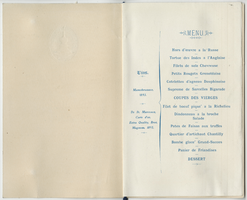Search the Special Collections and Archives Portal
Search Results
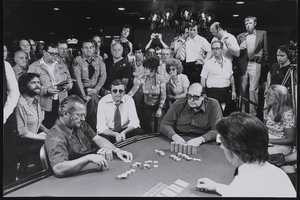
Photograph of gamblers at the 7th World Series of Poker, Las Vegas (Nev.), 1976
Date
Archival Collection
Description
Doyle Brunson, also known as "Texas Dolly," the bald man with dark-rimmed glasses seated at end of table, won $300,000 in this 7th World Series of Poker held at the Horseshoe Casino in Las Vegas. The photo shows "Texas Dolly" and other players playing poker while a large crowd watches them the background. Site Name: Horseshoe Club (Las Vegas, Nev.)
Image
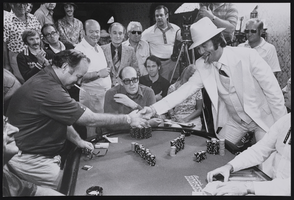
Photograph of two men shaking hands at a poker tournament, Las Vegas (Nev.), 1976
Date
Archival Collection
Description
At the end of the table we can see another view of Doyle Brunson who won $300,000 in the Seventh World Series of Poker, Horseshoe Casino, Las Vegas. Standing in the white suit and hat is Crandall Addington shaking hands with another poker player at the table. Site Name: Horseshoe Club (Las Vegas, Nev.)
Image

Alex de Castroverde oral history interview: transcript
Date
Archival Collection
Description
Oral history interview with Alex de Castroverde conducted by Monserrath Hernandez on April 17, 2019 for the Latinx Voices of Southern Nevada Oral History Project. In this interview, De Castroverde discusses his family's background and his parent's emigration story from Cuba to the United States. He talks about growing up in Reno, Nevada, his father becoming a lawyer, and attending the University of Nevada, Reno. De Castroverde remembers the establishment of De Castroverde Law Group, the significance his father had on the Hispanic community in Las Vegas, Nevada, and taking over operations of the law firm with his brother. Lastly, De Castroverde talks about his involvement with Cristo Rey St. Viator College Preparatory High School, the Guinn Center, and the Las Vegas Business Academy.
Text

Meeting minutes for Consolidated Student Senate, University of Nevada, Las Vegas, February 21, 1978
Date
Archival Collection
Description
Text

Anita Tijerina Revilla oral history interview: transcript
Date
Archival Collection
Description
Oral history interview with Anita Tijerina Revilla conducted by Marcela Rodriguez-Campo on October 09, 2018 for the Latinx Voices of Southern Nevada Oral History Project. In this interview, Revilla discusses her early life in San Antonio, Texas. She talks about her decision to make education a priority, figuring out the college application process on her own, and her initial interest in social justice. Revilla talks about how her critical consciousness was developed, and her pedagogical approach to teaching. Revilla describes her role in the 2006 May Day march, advocating advocating for the queer community, and disrupting oppressive systems to increase educational access for students. Lastly, Revilla discusses ethnic studies and the history of inequality in the United States.
Text
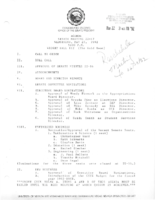
Meeting minutes for Consolidated Student Senate University of Nevada, Las Vegas, May 27, 1992
Date
Archival Collection
Description
Text
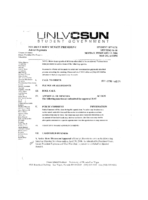
Meeting minutes for Consolidated Student Senate, University of Nevada, Las Vegas, February 13, 2006
Date
Archival Collection
Description
Text


